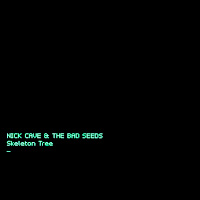 |
| Skeleton Tree album cover |
Different from prior albums, Skeleton Tree is minimalistic in every sense - the album artwork is very basic, all-black with just the names on the front. Eight tracks comprise the album, which is about typical for a Bad Seeds album, but the tracks are shorter. There is no eight minute long opus on this one. Cave opts for a more reflective spoke-word tone instead of singing or bitter licks. The instrumentation on most of the album is peeled back - revolving mainly around piano chords and an acoustic guitar with some songs adding extra channels.
The album opens on the hair-raising "Jesus Alone." The track begins with an oscillating synth sound meshed to a distorted guitar that fades in and out, a solemn string arrangement tying it all together. Cave enters, soft spoken word lyrics reflecting on loss. "With my voice / I am calling you" repeats throughout, evoking the feeling of calling out to someone repeatedly, only to be met with silence, emptiness. The stage is set and there is no going back.
"Rings of Saturn" lifts the veil of sorrow that we have donned and presents a glimpse of light and realization - "And this is the moment, this is exactly what she is born to be." "Girl in Amber" brings us back to the reality of the situation, however. Linked to his wife in the album's documentary One More Time With Feeling, the song has a dual perspective feel - on the one hand, referencing a girl in amber who essentially goes through the movements without feeling them (possibly referring to Cave's wife and how she handled their son's passing in the immediate days following the accident). On the other hand, the song references a spirit trapped between this world and the next with Cave saying it's okay, you can go - "And if you want to leave, don't breathe a word / And let the world turn..."
"Magneto" and "Anthrocene" continue the journey we've embarked on, delving into Cave's mind. Minimal in nature, both showcase Cave's cryptic lyrical prowess and a contemplation on higher powers. The deeply reflective "I Need You" is the ultimate point of the album. Cave ventures to sing more on this song instead of speaking, bringing a heart-piercing vulnerability to the foreground. I was initially turned off of this song because Cave's voice isn't quite in the right key for this one, but I think that's part of the point - to be so emotional that nothing is quite right and the same anymore. If crying could ever be put into music, this is the song to do that. Maybe it's easy (and incorrect) to assume this song is about as personal as it gets, but you can imagine a tearful Cave directing parts of this to his wife (notably the first half of the song) and others to his son (the second half, largely), in both cases wrought with anguish - "I need you, I need you, I need you."
"Distant Sky" transitions much as "Rings of Saturn" did to take a look at the larger picture and find some means of resolution. Else Torp guests on this one, giving an almost lullaby feel, telling the spirit to rise and let go. The album closes on the brighter self-titled track with a glimpse of moving on - "And it's alright now." You'll never be the same, but there is life after tragedy. It will be alright now.
The album, even with its ambient leanings and stripped down nature, is beautiful. Even as it conveys the grieving process perhaps specific to Cave's situation, it's one that can easily be extrapolated to apply to anyone's grieving process - be it the loss of David Bowie at the start of the year, the loss of a friend, or, in Cave's case, the loss of a close family member. This isn't an album to be listened to in one sitting before forming a final decision. As I continue to listen to it still, my perception of the album keeps changing. There's a subtlety to it that takes several listens to become apparent. It's a strong album, but the tragedy in it is that it took such a catastrophic loss to birth it. My heart breaks all over again for the Cave family.
